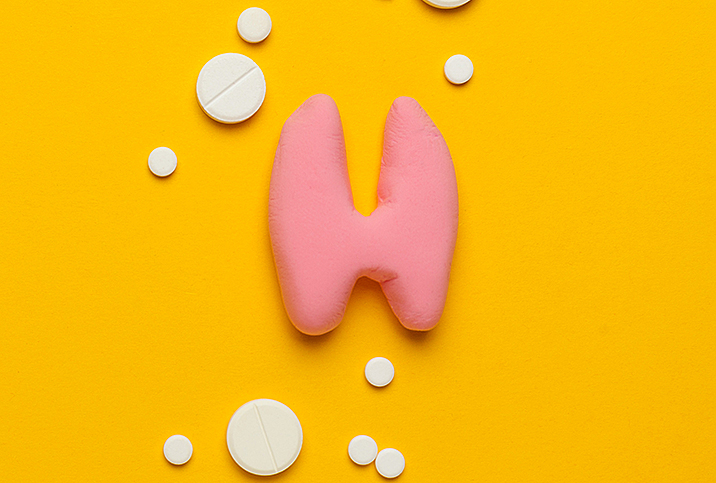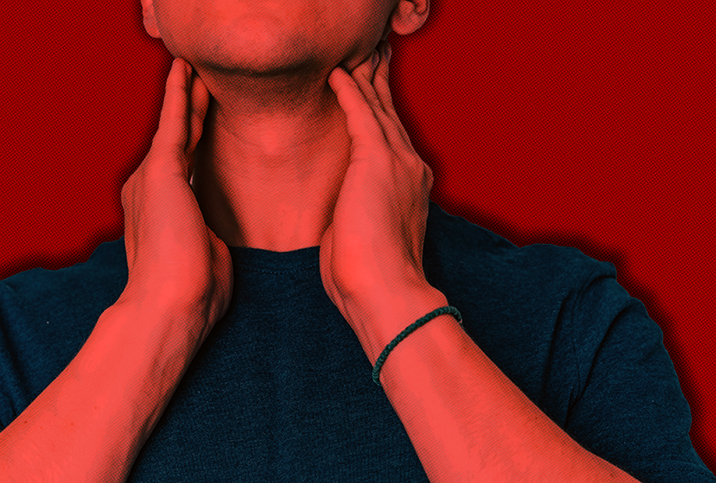All You Need to Know About Hypothyroidism

Hypothyroidism is a condition in which the thyroid gland is underactive, releasing too few critical hormones into the bloodstream, resulting in a slower metabolism among other symptoms.
Hypothyroidism affects about 5 in 100 Americans ages 12 and older, according to the National Institute of Diabetes and Digestive and Kidney Diseases (NIDDK). According to the American Thyroid Association, it's more common in women (five to eight times more likely), especially at ages 60 and over. Overall, about 1 in 8 women will develop hypothyroidism.
It's estimated that more than 20 million people in America have some form of thyroid condition and that 60 percent are not aware they have any issues. This is because most people have mild or no noticeable symptoms, especially in the early stages. Over time, untreated hypothyroidism can cause various issues, impacting energy levels, mental health, digestion and fertility.
If thyroid hormone levels become exceedingly low, you could develop a rare condition called myxedema, whose effects may be life-threatening, including symptoms such as anemia and low body temperature, leading to conditions including heart failure and, in some cases, coma.
Fortunately, a doctor can diagnose hypothyroidism with a blood test, and safe and effective treatment options are available.
What is the thyroid and what does it do?
The thyroid is a small, butterfly-shaped gland located in the middle front portion of the neck. The gland produces hormones triiodothyronine (T3) and thyroxine (T4), which affect several bodily functions including heart rate, temperature and metabolism. Metabolism is the method the body uses to transform calories from food and beverages into energy to power various systems, such as heartbeat, digestion, cognition, and cell repair and regeneration.
The pituitary gland is located at the base of the skull and dictates thyroid hormone production. It produces thyroid-stimulating hormone (TSH) based on the thyroid hormone levels it detects, and if it senses insufficient thyroid hormone, it will make more TSH, or vice versa.
What causes hypothyroidism?
According to the Cleveland Clinic, hypothyroidism can be caused by conditions directly impacting the thyroid or, in rare cases, pituitary gland failure, when the pituitary gland does not produce enough TSH.
Hashimoto's thyroiditis—also known as Hashimoto's disease—is the most common cause of hypothyroidism. Hashimoto's is a hereditary autoimmune condition that prompts the immune system to confuse healthy cells for harmful invaders and attack the thyroid, resulting in chronic inflammation that damages the gland and inhibits hormone production. It usually arises in middle-aged women, although it can affect men and younger people as well.
Other causes of hypothyroidism include:
- Thyroiditis, or inflammation of the thyroid
- Hyperthyroidism (overactive thyroid) treatment, such as radiation or surgery
- Iodine deficiency
- Specific viruses
- Pregnancy
- Various medications, such as lithium
What are the symptoms of an underactive thyroid?
Symptoms can vary from person to person—depending on the condition severity—and tend to develop gradually, according to the Mayo Clinic. Common symptoms of an underactive thyroid include:
- Fatigue
- Increased sensitivity to cold
- Dry skin
- Weight gain
- Puffy face
- Enlarged thyroid gland
- Constipation
- Muscle weakness, aches, tenderness and stiffness
- Pain, stiffness and swelling in the joints
- Irregular or unusually heavy menstrual periods
- Hair loss
- Slower heart rate
- Depression
- Memory impairment
- Elevated cholesterol
- Erectile dysfunction
Treatment options
A doctor—usually an endocrinologist—can diagnose hypothyroidism with a blood test.
Unfortunately, there is no known way to prevent hypothyroidism. Mild thyroid hormone imbalances may even out on their own, but moderate or severe deficiencies require lifelong treatment, including medication and lifestyle changes.
Levothyroxine is a commonly prescribed medication used to increase thyroid hormone production. You will need to take the medicine for the remainder of your life to maintain sufficient thyroid hormone levels, though dosage may change over time based on factors such as weight gain or loss.
Many people with hypothyroidism also find dietary changes helpful in managing symptoms. However, consult with your doctor or a nutritionist about potentially changing your diet in order to best alleviate symptoms. For example, some clinical evidence suggests diets such as low-glycemic, gluten-free, dairy-free, Paleo, grain-free and sugar-free may benefit people with an underactive thyroid. Likewise, certain foods and supplements may help you manage specific symptoms, such as hair loss, fatigue and depression.


















